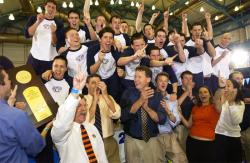A 20-something's Plea to U.S. Masters Swimming
Lets show future generations of Masters swimmers what we've got
The Division I NCAA Championship meet is one of the finest displays of teamwork, dedication, guts and glory. Hundreds of 18- to 22-year-olds come together with their coaches, athletic trainers, massage therapists, athletic departments and other support staff to put it on the line, leave it in the pool and give it all they've got. Last week I had the opportunity to witness the 2009 Women's Division I NCAA Championship meet. I saw fast swims, shattered records, high fives and smiles. On day three of the marathon-of-a-meet, I saw tears. The senior girls shed tears, the parents of senior girls shed tears and even the coaches of the senior girls shed tears because each of them knew that a chapter in the life of that athlete had ended moments earlier. "I had a good swimming career," I overheard one girl manage to squeeze out between sniffles with whom I assume to be her mother in the women's locker room after the meet. As I choked back tears myself, I was quick to say, "In my world, one's swimming journey has barely started at the age of 22."
I attended six sessions of the NCAA Championship meet and I saw hundreds of swims and the only thought that ran through my head was, "How are we going to show these women that this is just the beginning? It doesn't have to end here."
Senioritis. This emotional state occurs in seniors ready to move on, seniors who are sick of homework, studying and, yes, even swimming. They are ready to ditch their strict diets and intense practices and they are convinced that life will be easier, more rewarding and fun if they can just get themselves through the final semester of college and out into the "real world." As a 27-year-old who had these same ideas five years ago, I can understand their angst and sense of urgency. However, today as I long to find time to work out, I miss my teammates and crave an athletic department to hold me accountable. I shake my head and want to yell to all of these seniors, all of the girls that I watched swim their alleged "last meet" last week, "DON'T STOP SWIMMING! Don't give up on the fire to beat the person in the lane next to you. Don't hang your suit up quite yet. There is a place for you."
There may be no way to cure the symptoms of this more-dangerous-than-we-think state called senioritis. However, each Masters swimmer out there has the power to minimize the pain. Many of us know collegiate swimmers. We swim at or near college campuses. And each of us has the responsibility to share our experiences with these athletes. Very few of the women who competed in the meet last week scored any points for their team. Some of the women competing in the meet swam in a single event, and even more college swimmers sat at home watching the meet via live streaming on the Internet because they had not qualified. My heart broke for these swimmers, but my most intense feeling was not sadness but a sense of urgency on our part as members of the largest Masters aquatic organization in the world. I was almost panicky as I thought of time passing in the lives of these athletes who think that their swimming career is over. We, as U.S. Masters Swimming, talk about building our membership base. We work hard to add benefits and value for you. We secure corporate partnerships and continue to deliver news and information. Now is the time that each of us, members of the staff, members of the Board of Directors, coaches, volunteers and Masters swimmers, must make a commitment to the next generation of Masters swimmers. So, raise your right hand and repeat after me (yes, I know you are at work, sitting at home or maybe even at a coffee shop and that this act may draw attention, but the good it will do for the swimming community will far surpass your momentary embarrassment): "I will reach out to a 20-something swimmer. I will share my experiences that I've accumulated within U.S. Masters Swimming. I will make sure that that 20-something understands that there is no pressure, that there are no strict diets, weigh-ins or test sets that determine your placement on the team. I will invite him or her to my workout. I will help to grow U.S. Masters Swimming one 20-something at a time."
This week, the Men's Division I NCAA Championship meet will be held in College Station, Tex., at Texas A&M University. Like the women last week, many men will declare this their final meet. Let's not allow this declaration. Reach out to your children, your children's friends, your former college coaches, athletic departments or the college swimmers you pass by on the way to the pool deck and remind them that this is not the end of their swimming journey, but merely the beginning.
Categories:
- About USMS
SIGN UP FOR UPDATES FROM USMS














